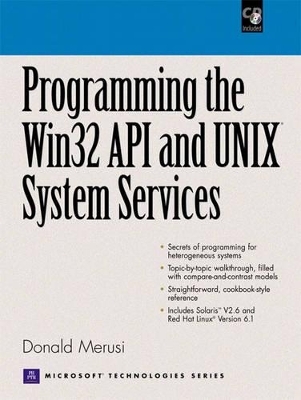
Programming the Win32 API and UNIX System Services
Prentice Hall
978-0-13-025969-1 (ISBN)
- Titel ist leider vergriffen;
keine Neuauflage - Artikel merken
The book will present a compare and contrast of techniques used to write programs of comparable functionality in both Microsoft Windows and Unix platforms. The UNIX platforms focused on will be Sun Microsystem's Solaris and Red at Linux. UNIX and Microsoft Windows are the two most popular programming platforms today and this book will cover the basic API and system service calls used in practically all programs.
Don Merusi is a leading technical consultant for a major New England corporation involved with the Microsoft Windows and UNIX environments. He is also a faculty member at Rensselaer at Hartford.
1. Processes and Threads.
Creating Threads in Microsoft Windows. Sample Threads Program. Using Thread Local Storage. Controlling Thread Execution. Managing Thread Priority. Working with Fibers in Microsoft Windows. Creating Processes in Microsoft Windows. Creating POSIX Threads in UNIX. Performing One-Time Initialization with POSIX Threads. Scheduling Processes in UNIX: Using the fork(), exec() and wait() Routines. The POSIX Threads Attributes Object. POSIX Thread Scheduling. POSIX Threads Cancellation. POSIX Threads Cancellation Cleanup Handlers. POSIX Threads Thread-Specific Data. The Linux _clone() Routine. Summary.
2. Controlling Concurrent Activity.
Concurrency Control Functions in the Win32 API. Mutexes. Semaphores. Events. Critical Sections. Concurrency Control Functions in UNIX. Semaphores-POSIX Threads Version. Semaphores-System V Version. POSIX Threads Mutexes. POSIX Condition Variables. RW Locks. Using the fcntl Routine for Synchronization. Summary.
3. Preparing for the Unexpected.
UNIX Signals. Establishing a UNIX Signal Handler. The UNIX Signal Mask. The sigwait Function. The sigsetjmp and siglongjmp Routines. UNIX Signal Handling in Microsoft Windows. Exit Handlers. Fork Handlers. Asynchronous Procedure Calls (APCs). Structured Exception Handling. SEH: Termination Handlers. SEH: Exception Handlers. The AbnormalTermination Routine. C++ Exception Handling. Summary.
4. Managing Files and File Systems.
Standard I/O Routines. Microsoft Windows Overview of FAT and NTFS. The CreateFile, ReadFile, and WriteFile Routines. Using APCs with ReadFileEx and WriteFileEx. File Record Locking Using UnLockFile and LockFile. Enhanced File Locking with LockFileEx and UnlockFileEx. Directory Manipulation. Device Manipulation. File Change Notification. File Manipulation. Manipulating a File Pointer. File Times. Memory-Mapped Files. Searching for Files. Getting File Attribute Information. UNIX File System Overview. The AIO Routines in Solaris. File Record Locking Using fcntl. File Attributes Using stat, fstat, or lstat. Manipulating a File Pointer. File Mapping in UNIX. File Times in UNIX. Summary.
5. Working with Memory.
ANSI C Memory Routines. The C++ new and delete Operations. The Microsoft Windows Virtual Memory Management Routines. The VirtualAlloc Routine. The VirtualFree Routine. The VirtualLock Routine. The SetProcessWorkingSetSize Routine. The VirtualUnlock Routine. The VirtualProtect Routine. The VirtualQuery Routine. The GetSystemInfo Routine. The GlobalMemoryStatus Routine. Sample Microsoft Windows VMM Program. The Microsoft Windows Heap Routines. GetProcessHeap, HeapAlloc, HeapReAlloc, HeapSize, and HeapFree. Other Handy Heap Routines. The HeapCreate Routine. Additional Memory Management Functions in Solaris. Routine mctl. The memcntl Routine. Routine mlock and munlock. The getpagesize Routine. The mlockall and munlockall Routines. The mprotect Routine. The plock Routine. The IPC Shared Memory Routines. Summary.
6. Networking and Other Communication Mechanisms.
Basic Windows Communication. Mailslots. Microsoft Windows Named Pipes. The CreateNamedPipe API. The ConnectNamedPipe API. WaitNamedPipe. Microsoft Windows and UNIX TCP and UDP Communications. Connection-Oriented Client-Server Architecture. Big-Endian versus Little-Endian. Connectionless-Oriented Client-Server Architecture. UNIX Unnamed Pipes. UNIX Named Pipes. UNIX Message Services. Summary.
7. Protecting System Resources.
Microsoft Windows Security: Access Tokens and Security Descriptors. Programming Basic Security in Microsoft Windows. InitializeSecurityDescriptor. InitializeAcl. LookupAccountName. AddAccessAllowedAce and AddAccessDeniedAce. Microsoft Windows Sample Security Program. Managing Access Tokens. AdjustTokenPrivileges. LookupPrivilegeValue. OpenProcessToken and OpenThreadToken. SetThreadToken. CheckTokenMembership. GetTokenInformation. LookupAccountSid. GetAclInformation. Dumping an Access Token. Managing Security Descriptors. GetKernelObjectSecurity. GetSecurityDescriptorDacl and GetSecurityDescriptorSacl. SetSecurityDescriptorDacl and SetSecurityDescriptorSacl. Dumping a Security Descriptor. Controlling Privileges/Rights. Adding and Removing ACLs. ACLs in Solaris. Setting and Retrieving ACL Information. Converting ACLs to and from Internal/External Representation. Other UNIX Security Functions. Getting and Setting User IDs and Group IDs. chmod & chown. Summary.
Appendix. The Ice Cream Shop Simulation.
Index.
| Erscheint lt. Verlag | 22.11.2000 |
|---|---|
| Verlagsort | Upper Saddle River |
| Sprache | englisch |
| Maße | 179 x 234 mm |
| Gewicht | 636 g |
| Themenwelt | Informatik ► Betriebssysteme / Server ► Unix / Linux |
| Informatik ► Betriebssysteme / Server ► Windows | |
| Mathematik / Informatik ► Informatik ► Netzwerke | |
| ISBN-10 | 0-13-025969-1 / 0130259691 |
| ISBN-13 | 978-0-13-025969-1 / 9780130259691 |
| Zustand | Neuware |
| Haben Sie eine Frage zum Produkt? |